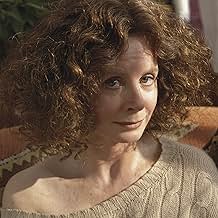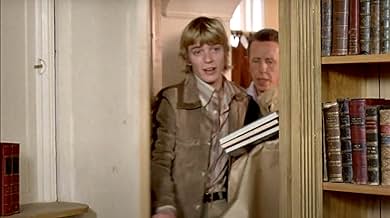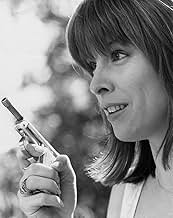Philip Marlowe es un ojo privado, quien se involucra en un peligroso caso de asesinato y chantaje.Philip Marlowe es un ojo privado, quien se involucra en un peligroso caso de asesinato y chantaje.Philip Marlowe es un ojo privado, quien se involucra en un peligroso caso de asesinato y chantaje.
- Karl Lundgren
- (as Simon Turner)
Argumento
¿Sabías que...?
- CuriosidadesJames Stewart had difficulty saying his lines on time due to hearing and possibly memory problems. Some of the cast were shocked by his aged appearance. Robert Mitchum recalled, "The picture was all about corpses, but Jimmy looked deader than any of them." Stewart actually outlived Mitchum by one day, nearly 20 years later.
- PifiasWhen Marlowe takes the gun from Camilla after she unloads it on him with multiple blank rounds, he grabs the barrel with his bare hands. That should have proved to be very painful as the barrel would be extremely hot.
EDIT: This is incorrect. Blank cartridges in a small calibre gun will not heat the barrel to any great extent. A gun barrel gets hot mainly due to the friction of the bullet going through the barrel, not from the powder in the cartridge.
- Citas
Charlotte Sternwood: [when Marlowe declines to blackmail her] Wha-? You don't want money?
Philip Marlowe: Oh sure. All I itch for is money. I'm so greedy that for fifty pounds a day plus expenses on the day I work, I risk my future, the hatred of the cops, of Eddie Mars and his pals, I dodge bullets and put up with slaps and say "Thank you very much. If you have any further trouble please call me: I'll just put my card here on the table." I do all that for a few pounds. And maybe just a little bit to protect what little pride a sick and broken old man has in his family, so that he can believe his blood is not poisoned. That his little girls - though they may be a trifle wild - are not perverts and killers.
- ConexionesFeatured in James Stewart, Robert Mitchum: The Two Faces of America (2017)
And that's what makes it so difficult to transfer his works to the screen. You almost have to have a voice-over from Philip Marlowe otherwise you not only get lost in the various plot twists but you miss the adamantly low-brow tropes -- "her hair was the color of gold in old paintings," or, "she threw me a glance I could feel in my hip pocket." "Chinatown," set in 1937 LA, was released to great critical and public acclaim in 1974. The very next year, Robert Mitchum tackled Philip Marlowe in "Farewell, My Lovely" and he was great, and so was the production, even if it was not the masterpiece that "Chinatown" was. Nobody will ever make a masterpiece out of a Chandler story because, after all, a masterpiece usually starts out with a coherent plot.
So the trick is to capture on screen what Chandler's prose evokes on the written page. Style is everything. "Farewell My Lovely" had it. "The Big Sleep," alas, doesn't. The director hasn't really done much to help things. In the 1946 version of "The Big Sleep," Howard Hawks at least had some fun with the characters. (Bogart and the horn-rimmed glasses in the book shop.) Hawks also allowed some humor in the dialog. ("She tried to sit in my lap while I was standing up.") Philip Marlowe with his resolutely seedy presence belongs in the marginal zone of Los Angeles, not in the uptrodden neighborhoods of London. He belongs in a trench coat, wearing an older fedora, not in the powder blue suits of Saville Row. ("I own a hat and a coat and a gun," he tells Nulty in "Farewell My Lovely," "and everything I touch turns to s***.") In this film we have to put up with a confident and compassionate Marlowe, striding through the fancy decor instead of slouching, never touching a drop of alcohol. And Mitchum doesn't add much to the story besides his usual heft. As James Agee once said of him, his casual languor suggests Bing Crosby supersaturated on barbiturates.
That reminds me. I couldn't help wondering, while I watched this, how much booze had gone into the production. I forget whether Chandler had quit drinking by the time he wrote this, but Mitchum himself was hardly an amateur. Olivier had kicked Cyril Cusack out of the Old Vic for showing up drunk for a performance of "Doctor's Dilemma" and reciting lines from another of Shaw's plays. Richard Boone was evidently immobilized during his last few years and Oliver Reed died of drink.
Still, look at the actors in this thing. In support are Edward Fox, Harry Andrews, James Donald, Colin Blakely, James Stewart, and Richard Todd. And all of them are up to the task, true professionals, with not a hollow note struck. I'm tempted to call the cast "peerless" but I don't know if it's permitted if there's a theatrical knight among them. Richard Boone is outstanding as Canino -- a villainous wreck, hobbling about on a broken foot, cackling over his own sliminess, howling with unrestrained glee as he watches a harmless little man whom he has just poisoned crash through a glass door and die.
Also notable are the locations and the art direction. It may not be sleazy Los Angeles in 1941 but London and its interiors look just fine. London has never looked less grimy. There is no rain or fog, the streets are clean, narrow and lined with classy book shops, and people tend to drive new and expensive cars.
Well, the movie is done with dash and style, no doubt about that. But it's the wrong style. Marlowe belongs in the 1940s. In the 1940s pornography and dope could get you serious jail time -- just ask Mitchum.
I didn't much care for it the first time I saw this. The second time was easier going because I'd lowered the bar of my expectation.
- rmax304823
- 17 abr 2005
- Enlace permanente
Selecciones populares
Detalles
- Fecha de lanzamiento
- Países de origen
- Idioma
- Títulos en diferentes países
- The Big Sleep
- Localizaciones del rodaje
- Knebworth House, Knebworth, Hertfordshire, Inglaterra, Reino Unido(Sternwood Mansion)
- Empresas productoras
- Ver más compañías en los créditos en IMDbPro
Taquilla
- Presupuesto
- 3.000.000 GBP (estimación)
Contribuir a esta página


























